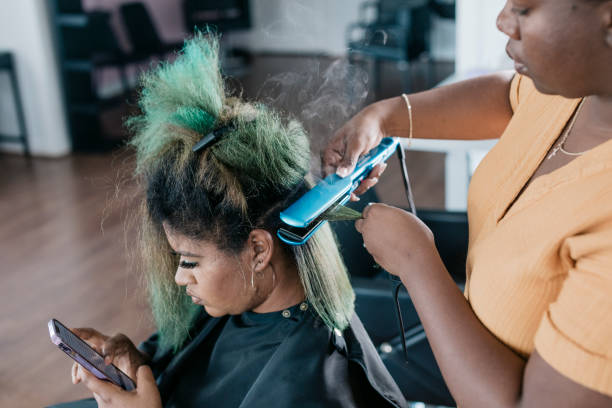
Could the products you put in your hair be increasing your risk of developing cancer? Ongoing research has previously suggested that hair straightening chemicals are associated with an increased risk of certain hormone-related cancers, including breast and ovarian cancers, and now, a new study links the use of hair straightening products with an increased risk of uterine cancer.
For years, uterine cancer has been considered a relatively rare disease in the U.S., however, in recent years those rates have increased. Women who use hair-straightening chemicals are at an increased risk of uterine cancer compared with those who do not use the chemicals, according to new findings of the Sister Study, run by the National Institutes of Health. Naturally, Black women are at a higher risk because they are more likely to use chemical hair-straightening products than women of other races.
What the study shows
The study, published in the Journal of the National Cancer Institute, estimates that among women who did not use hair-straightening chemical products in the past 12 months, 1.6% developed uterine cancer by age 70, but about 4% of the women who frequently use such hair-straightening products developed uterine cancer by age 70.
“In this study, women with frequent use in the past year had an over two-fold higher risk of uterine cancer,” Chandra Jackson, an author of the study and researcher at the National Institute of Environmental Health Sciences says. Frequent use means the women used the products more than four times in the previous year.
So which products put you at risk?
The researchers found a strong association between hair straightening products and uterine cancer cases, however, the use of other hair products – such as dyes and perms or body waves – was not associated with uterine cancer.
RELATED: New Study Finds Link Between Black Hair Products and Breast Cancer
Black women and cancer
According to study data, the association between hair straightening products and uterine cancer cases was most pronounced for Black women, who made up only 7.4% of the study participants, but 59.9% of those who reported ever using straighteners.
There are many reasons Black women are more likely to use straightening products including Eurocentric standards of beauty, social pressures placed on them in the workplace, settings related to microaggressions and the threat of discrimination.
Whatsmore, sometimes Black women just desire the versatility of being able to change their hairstyles and use their hair as a form of self-expression.
“The bottom line is that the exposure burden appears higher among Black women,” Jackson says.
“Based off of the body of the literature in this area, we know that hair products marketed directly to Black children and women have been shown to contain multiple chemicals associated with disrupting hormones, and these products marketed to Black women have also been shown to have harsher chemical formulations,” she adds. “On top of that, we know that Black women tend to use multiple products simultaneously, which could contribute to Black women on average having higher concentrations of these hormone-disrupting chemicals in their system.”
RELATED: Breast Cancer Survivor Sheds Light On Toxic Chemicals in Beauty Products
Which products should you steer clear of?
The researchers did not collect information on the brands or ingredients in the hair products the women used, however, there are several chemicals identified in straighteners that could contribute to the increased incidence of uterine cancer observed in the study.
“To our knowledge this is the first epidemiologic study that examined the relationship between straightener use and uterine cancer,” Alexandra White, head of the National Institute of Environmental Health Sciences Environment and Cancer Epidemiology group and lead author on the study, said in a news release Monday.
“More research is needed to confirm these findings in different populations, to determine if hair products contribute to health disparities in uterine cancer, and to identify the specific chemicals that may be increasing the risk of cancers in women.”
Although more research needs to be done, you can start by taking matters into your own hands. Start by taking a closer look at some of the haircare products on your shelf. Do any of them contain parabens and phthalates? Do they have fragrance chemicals? Many of these ingredients have been linked to cancer, birth defects, hormone disruption, and other chronic health problems so it is wise to choose products that are free of these ingredients.









